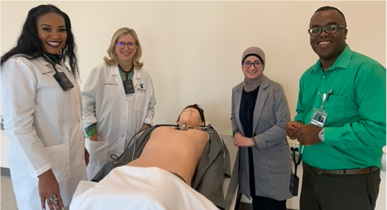Dean's Update
June 16, 2023 - Aron Sousa, MD

Photo L-R: Michigan State University Board of Trustees Chair Rema Vassar, PhD, MSU Interim President Teresa Woodruff, PhD, Harvey®, medical student Fadwat Bazzi, and Assistant Professor Uchebike Nwankwo, MD, at the heart sounds station.
Friends,
This week, the MSU Board of Trustees has been on retreat in Grand Rapids. Thursday, they visited the Secchia Center and the Doug Meijer Medical Innovation Building for their meetings and time with our faculty, staff, and students. A highlight of the visit was a morning in the Simulation Center at Secchia. As most of you know, our first- and second-year medical students do a half day of simulation each week during the ECE and MCE. So, the trustees and about a dozen most reverend university administrators spent Thursday morning learning to suture, listening to heart sounds with Harvey®, doing some point of care ultrasound on exam models, and helping with a mock code. We did tours and little talks, but what they all really liked was the hands-on tasks and simulations with the students and faculty. On a very short timeline, Dr. Matt Emery and the simulation team did an incredible job designing and implementing the morning’s program.
In addition to their retreat, the board held their June public meeting in the Secchia Center this morning (Friday). In that meeting, our own Dr. Irving Vega did the faculty research presentation on his work linking bench science with community-based participatory research. He did a great job, and the board clearly recognized the depth and importance of his work and the college’s dedication to partnering on science with community members.
A bit further down their agenda, the board approved the Dr. Harry D. Brickley Endowed Scholarship in Human Medicine linked with the Mashkiki Endowed Scholarship in Human Medicine. Dr. Brickley is a retired surgeon with a deep interest in supporting students from Native American backgrounds, and he has provided $100,000 in support of a scholarship to the College of Human Medicine for a student from a federally recognized tribe. The Mashkiki Endowed Scholarship is support to bring the total funding to $200,000.
These two scholarships will be given together and form a pillar of the college’s Indigenous Pathway. At the start the pathway, the college has an Early Assurance Opportunity for students at Bay Mills Community College, one of the state’s tribal colleges. These scholarships help support students financially. And this year, the college and Dr. Frank Animikwam, (CHM ’17), have begun a clinical experience for our students in the Petoskey tribal health clinic of the Little Traverse Bay Bands of Odawa Indians, for which Frank is the medical director. The students have had a wonderful experience with Dr. Animikwam and the community. We are working to broaden our collaboration carefully and respectfully with the tribes and Indigenous people in our communities, but at this point I am happy we have an entry for applicants, financial support for students, and mentorship and clinical experiences as part of our developing Indigenous pathway.
Mashkiki, the name of our second scholarship, is an Ojibwe term for medicine. The college and its communities are on the ancestral lands of the Ojibwe, Odawa, and Potawatomi people; the lands of the Anishinaabeg. Over a series of treaties spanning 1807-1842, the government took over the land that now forms the State of Michigan and the communities of the college.
When you walk next to the Red Cedar River just east of the Kellogg Center, you are walking a high bank populated with oak trees that are big enough to be wild trees present in 1857 when there was an “Indian Encampment” on campus. The trees are old enough that the current bank must be about as high and big as it was back in 1857, and it would have been one of the few dry areas in the otherwise swampy wetlands of the future campus. Over countless generations, native people walked and lived on that same path on the high bank, until campus expanded and they were dispossessed of their land on the banks of the Red Cedar.
Serving the people with you,
Aron
Aron Sousa, MD, FACP
Dean

